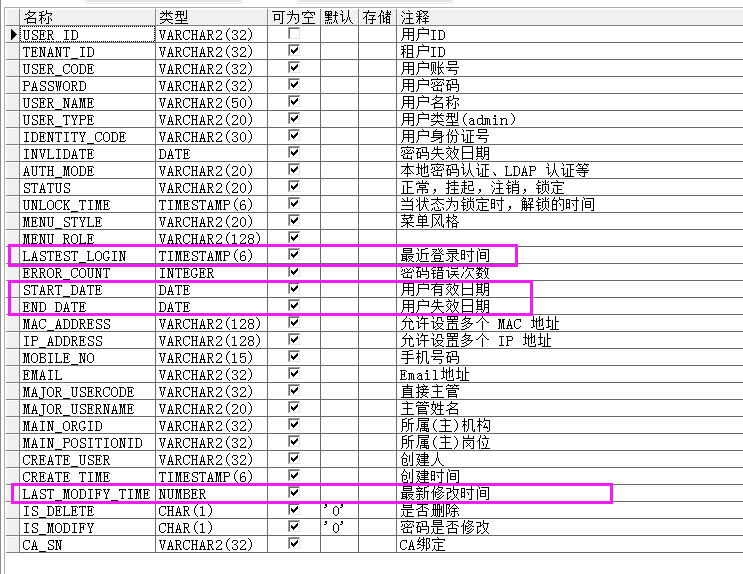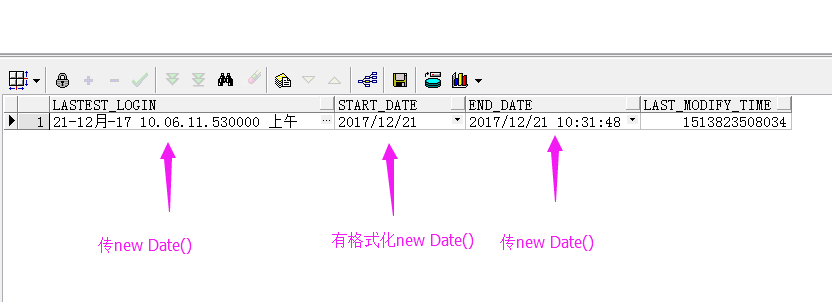在平时的开发中,会在数据库中记录该条记录相关的操作时间,或业务上要用到的时间格式

正常使用中有以下三种类型:
1. 使用Timestamp,则会在数据库里存储:2017-12-21 07:20:01。
在不同时区,显示的都是2017-12-21 07:20:01,但其实他们并不是同一时间了。
2. 存储事件发生的时间毫秒值,在不同时区解析出来的时间表示不一样,但表达都是同一时间,能解决时区问题。
3. 直接是Date类型是数据格式,存储年月日。
在数据库里头的展示格式如图所示:

Java代码里头获取的时间如图所示:
1.TIMESTAMP格式
afaUser.setLastestLogin(new Date());
2.时间毫秒级
loginlog.setLastModifyTime(new Date().getTime());
3.Date类型
afaUser.setEndDate(new Date());
SimpleDateFormat sf=new SimpleDateFormat("yyyy-MM-dd"); try { afaUser.setEndDate(sf.parse(sf.format(new Date()))); afaUser.setStartDate(sf.parse(sf.format(new Date()))); } catch (ParseException e) { e.printStackTrace(); }
格式化注意由于数据库是Date类型,所以无论怎么格式化,还是2017/12/21这种格式。

在往前端传值的时候,若是TIMESTAMP类型,前端获取的是long类型的时间戳,这时候就要进行格式转换。所以这种格式比较麻烦,尽量少用。
一、在实体类中进行转换
@Column(name = "LASTEST_LOGIN") private Date lastestLogin; //返回前端会是毫秒时间戳。 @Transient private String lastLoginDate; //新建一个字段,将lastestLogin格式转化所需要的时间格式。 public String getLastLoginDate() { SimpleDateFormat sf=new SimpleDateFormat("yyyy-MM-dd HH:mm:ss"); try { if(this.lastestLogin!=null){ lastLoginDate=sf.format(lastestLogin); } } catch (Exception e) { } return lastLoginDate; } public void setLastLoginDate(String lastLoginDate) { this.lastLoginDate = lastLoginDate; }
二、在前端web进行转换
<script language="javascript"> //扩展Date的format方法 Date.prototype.format = function (format) { var o = { "M+": this.getMonth() + 1, "d+": this.getDate(), "h+": this.getHours(), "m+": this.getMinutes(), "s+": this.getSeconds(), "q+": Math.floor((this.getMonth() + 3) / 3), "S": this.getMilliseconds() } if (/(y+)/.test(format)) { format = format.replace(RegExp.$1, (this.getFullYear() + "").substr(4 - RegExp.$1.length)); } for (var k in o) { if (new RegExp("(" + k + ")").test(format)) { format = format.replace(RegExp.$1, RegExp.$1.length == 1 ? o[k] : ("00" + o[k]).substr(("" + o[k]).length)); } } return format; } /** *转换日期对象为日期字符串 * @param date 日期对象 * @param isFull 是否为完整的日期数据, * 为true时, 格式如"2000-03-05 01:05:04" * 为false时, 格式如 "2000-03-05" * @return 符合要求的日期字符串 */ function getSmpFormatDate(date, isFull) { var pattern = ""; if (isFull == true || isFull == undefined) { pattern = "yyyy-MM-dd hh:mm:ss"; } else { pattern = "yyyy-MM-dd"; } return getFormatDate(date, pattern); } /** *转换当前日期对象为日期字符串 * @param date 日期对象 * @param isFull 是否为完整的日期数据, * 为true时, 格式如"2000-03-05 01:05:04" * 为false时, 格式如 "2000-03-05" * @return 符合要求的日期字符串 */ function getSmpFormatNowDate(isFull) { return getSmpFormatDate(new Date(), isFull); } /** *转换long值为日期字符串 * @param l long值 * @param isFull 是否为完整的日期数据, * 为true时, 格式如"2000-03-05 01:05:04" * 为false时, 格式如 "2000-03-05" * @return 符合要求的日期字符串 */ function getSmpFormatDateByLong(l, isFull) { return getSmpFormatDate(new Date(l), isFull); } /** *转换long值为日期字符串 * @param l long值 * @param pattern 格式字符串,例如:yyyy-MM-dd hh:mm:ss * @return 符合要求的日期字符串 */ function getFormatDateByLong(l, pattern) { return getFormatDate(new Date(l), pattern); } /** *转换日期对象为日期字符串 * @param l long值 * @param pattern 格式字符串,例如:yyyy-MM-dd hh:mm:ss * @return 符合要求的日期字符串 */ function getFormatDate(date, pattern) { if (date == undefined) { date = new Date(); } if (pattern == undefined) { pattern = "yyyy-MM-dd hh:mm:ss"; } return date.format(pattern); } //alert(getSmpFormatDate(new Date(1279849429000), true)); //alert(getSmpFormatDate(new Date(1279849429000),false)); //alert(getSmpFormatDateByLong(1279829423000, true)); alert(getSmpFormatDateByLong(1279829423000,false)); //alert(getFormatDateByLong(1279829423000, "yyyy-MM")); //alert(getFormatDate(new Date(1279829423000), "yy-MM")); //alert(getFormatDateByLong(1279849429000, "yyyy-MM hh:mm")); </script>
所以在实际使用过程中可以使用Date或者事件发生的时间毫秒值,少用TIMESTAMP类型进行数据的存储。
import java.text.*; import java.util.Date; /** SimpleDateFormat函数语法: G 年代标志符 y 年 M 月 d 日 h 时 在上午或下午 (1~12) H 时 在一天中 (0~23) m 分 s 秒 S 毫秒 E 星期 D 一年中的第几天 F 一月中第几个星期几 w 一年中第几个星期 W 一月中第几个星期 a 上午 / 下午 标记符 k 时 在一天中 (1~24) K 时 在上午或下午 (0~11) z 时区 */ public class FormatDateTime { public static void main(String[] args) { SimpleDateFormat myFmt=new SimpleDateFormat("yyyy年MM月dd日 HH时mm分ss秒"); SimpleDateFormat myFmt1=new SimpleDateFormat("yy/MM/dd HH:mm"); SimpleDateFormat myFmt2=new SimpleDateFormat("yyyy-MM-dd HH:mm:ss");//等价于now.toLocaleString() SimpleDateFormat myFmt3=new SimpleDateFormat("yyyy年MM月dd日 HH时mm分ss秒 E "); SimpleDateFormat myFmt4=new SimpleDateFormat( "一年中的第 D 天 一年中第w个星期 一月中第W个星期 在一天中k时 z时区"); Date now=new Date(); System.out.println(myFmt.format(now)); System.out.println(myFmt1.format(now)); System.out.println(myFmt2.format(now)); System.out.println(myFmt3.format(now)); System.out.println(myFmt4.format(now)); System.out.println(now.toGMTString()); System.out.println(now.toLocaleString()); System.out.println(now.toString()); } }
效果如下:
效果: 2004年12月16日 17时24分27秒 04/12/16 17:24 2004-12-16 17:24:27 2004年12月16日 17时24分27秒 星期四 一年中的第 351 天 一年中第51个星期 一月中第3个星期 在一天中17时 CST时区 16 Dec 2004 09:24:27 GMT 2004-12-16 17:24:27 Thu Dec 16 17:24:27 CST 2004